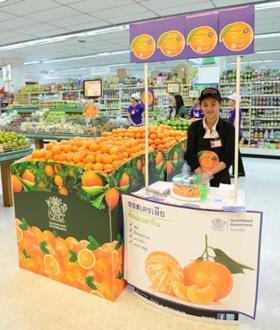
Thailand will again be a focus for marketing within the Queensland mandarin industry this year.
Exports to the South East Asian nation began gathering serious momentum last season, thanks to a pointed promotional programme, coordinated by the Queensland Government through its Global Markets Initiative programme (GMI).The programme proved so successful that sales volumes rose by close to 80 per cent in some stores where promotions were present.
While the GMI was wound back in June, a group of dedicated growers and exports have moved to build on the success of the programme, continuing to fund and coordinate marking activity in Thailand with the support of Trade and Investment Queensland.
“This year’s Thailand promotional programme will run from the beginning of August right through until September, with major promotions targeted just prior to the Moon festival (mid-August),” said Nandini Bose of Trade and Investment Queensland.“It is an evolving and exciting programme, that proves how a horticultural group with a common goal can drive demand for a product in international markets.”
The campaign will again be rolled out across leading retail chains Siam Makro, Big C, Tesco, Max Value and Foodland, while the Tops and Rim Ping banners have also come on board this season.
Similar to last year, in-store tastings and point-of-sale materials will form an integral part of the promotional push.Additional materials such as store brochures, magazines and banners have also been developed, and will be distributed through stores and electronically.
“Through Tops,our promotional message will be shared via SMS to a membership base of 6.9m consumers,” Bose explained. “We will also deliver 20,000 magazines directly to consumers’ homes, while another 2m consumers will receive it via email.”
Bose said the programme will be expanded beyond Bangkok, and into second-tier cities such as Chiang Mai and possibly Phuket. The benefits could also extend beyond the Thai border.
“We plan to increase the programme’s reach in Thailand’s retail and wholesale markets, and also aim to replicate this model in other Asian markets.”



